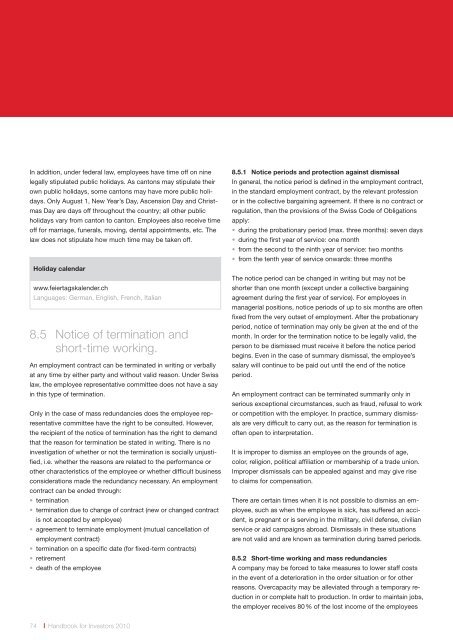Handbook for Investors. Business location in Switzerland.
Handbook for Investors. Business location in Switzerland.
Handbook for Investors. Business location in Switzerland.
You also want an ePaper? Increase the reach of your titles
YUMPU automatically turns print PDFs into web optimized ePapers that Google loves.
In addition, under federal law, employees have time off on n<strong>in</strong>e<br />
legally stipulated public holidays. As cantons may stipulate their<br />
own public holidays, some cantons may have more public holidays.<br />
Only August 1, New Year’s Day, Ascension Day and Christmas<br />
Day are days off throughout the country; all other public<br />
holidays vary from canton to canton. Employees also receive time<br />
off <strong>for</strong> marriage, funerals, mov<strong>in</strong>g, dental appo<strong>in</strong>tments, etc. The<br />
law does not stipulate how much time may be taken off.<br />
Holiday calendar<br />
www.feiertagskalender.ch<br />
Languages: German, English, French, Italian<br />
8.5 Notice of term<strong>in</strong>ation and<br />
short-time work<strong>in</strong>g.<br />
An employment contract can be term<strong>in</strong>ated <strong>in</strong> writ<strong>in</strong>g or verbally<br />
at any time by either party and without valid reason. Under Swiss<br />
law, the employee representative committee does not have a say<br />
<strong>in</strong> this type of term<strong>in</strong>ation.<br />
Only <strong>in</strong> the case of mass redundancies does the employee representative<br />
committee have the right to be consulted. However,<br />
the recipient of the notice of term<strong>in</strong>ation has the right to demand<br />
that the reason <strong>for</strong> term<strong>in</strong>ation be stated <strong>in</strong> writ<strong>in</strong>g. There is no<br />
<strong>in</strong>vestigation of whether or not the term<strong>in</strong>ation is socially unjustified,<br />
i.e. whether the reasons are related to the per<strong>for</strong>mance or<br />
other characteristics of the employee or whether difficult bus<strong>in</strong>ess<br />
considerations made the redundancy necessary. An employment<br />
contract can be ended through:<br />
• term<strong>in</strong>ation<br />
• term<strong>in</strong>ation due to change of contract (new or changed contract<br />
is not accepted by employee)<br />
• agreement to term<strong>in</strong>ate employment (mutual cancellation of<br />
employment contract)<br />
• term<strong>in</strong>ation on a specific date (<strong>for</strong> fixed-term contracts)<br />
• retirement<br />
• death of the employee<br />
8.5.1 Notice periods and protection aga<strong>in</strong>st dismissal<br />
In general, the notice period is def<strong>in</strong>ed <strong>in</strong> the employment contract,<br />
<strong>in</strong> the standard employment contract, by the relevant profession<br />
or <strong>in</strong> the collective barga<strong>in</strong><strong>in</strong>g agreement. If there is no contract or<br />
regulation, then the provisions of the Swiss Code of Obligations<br />
apply:<br />
• dur<strong>in</strong>g the probationary period (max. three months): seven days<br />
• dur<strong>in</strong>g the first year of service: one month<br />
• from the second to the n<strong>in</strong>th year of service: two months<br />
• from the tenth year of service onwards: three months<br />
The notice period can be changed <strong>in</strong> writ<strong>in</strong>g but may not be<br />
shorter than one month (except under a collective barga<strong>in</strong><strong>in</strong>g<br />
agreement dur<strong>in</strong>g the first year of service). For employees <strong>in</strong><br />
managerial positions, notice periods of up to six months are often<br />
fixed from the very outset of employment. After the probationary<br />
period, notice of term<strong>in</strong>ation may only be given at the end of the<br />
month. In order <strong>for</strong> the term<strong>in</strong>ation notice to be legally valid, the<br />
person to be dismissed must receive it be<strong>for</strong>e the notice period<br />
beg<strong>in</strong>s. Even <strong>in</strong> the case of summary dismissal, the employee’s<br />
salary will cont<strong>in</strong>ue to be paid out until the end of the notice<br />
period.<br />
An employment contract can be term<strong>in</strong>ated summarily only <strong>in</strong><br />
serious exceptional circumstances, such as fraud, refusal to work<br />
or competition with the employer. In practice, summary dismissals<br />
are very difficult to carry out, as the reason <strong>for</strong> term<strong>in</strong>ation is<br />
often open to <strong>in</strong>terpretation.<br />
It is improper to dismiss an employee on the grounds of age,<br />
color, religion, political affiliation or membership of a trade union.<br />
Improper dismissals can be appealed aga<strong>in</strong>st and may give rise<br />
to claims <strong>for</strong> compensation.<br />
There are certa<strong>in</strong> times when it is not possible to dismiss an employee,<br />
such as when the employee is sick, has suffered an accident,<br />
is pregnant or is serv<strong>in</strong>g <strong>in</strong> the military, civil defense, civilian<br />
service or aid campaigns abroad. Dismissals <strong>in</strong> these situations<br />
are not valid and are known as term<strong>in</strong>ation dur<strong>in</strong>g barred periods.<br />
8.5.2 Short-time work<strong>in</strong>g and mass redundancies<br />
A company may be <strong>for</strong>ced to take measures to lower staff costs<br />
<strong>in</strong> the event of a deterioration <strong>in</strong> the order situation or <strong>for</strong> other<br />
reasons. Overcapacity may be alleviated through a temporary reduction<br />
<strong>in</strong> or complete halt to production. In order to ma<strong>in</strong>ta<strong>in</strong> jobs,<br />
the employer receives 80 % of the lost <strong>in</strong>come of the employees<br />
74 <strong>Handbook</strong> <strong>for</strong> <strong>Investors</strong> 2010









